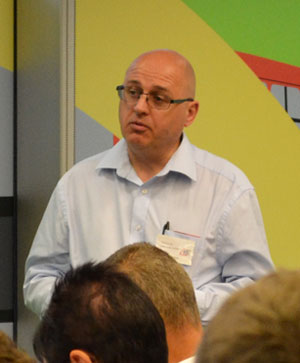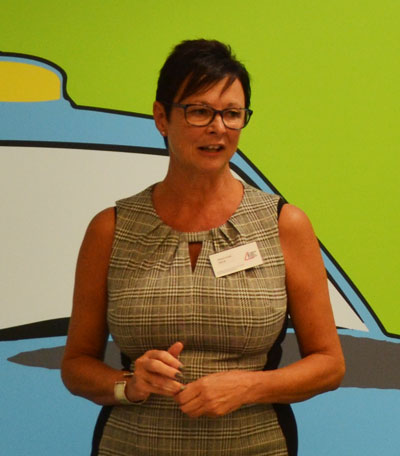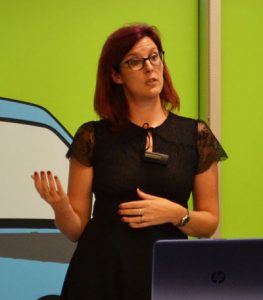The 2018 London Road Safety Council Conference had a heavy emphasis on improving the safety of powered two wheeler riders, with three of the five presentations focusing on this challenge.
The conference was held alongside the LRSC’s 2018 AGM at the TfL Palestra offices in Southwark on 20 July.
 Keith Prince, from the London Assembly Transport Committee, made an impassioned plea for motorcyclists to be allowed to use bus lanes across London.
Keith Prince, from the London Assembly Transport Committee, made an impassioned plea for motorcyclists to be allowed to use bus lanes across London.
He pointed out that while motorcycles account for just 1% of journeys made in London, 27% of people killed or seriously injured (KSI) on London’s roads are motorcyclists.
In 2016, 33 motorcyclists were killed in collisions on London’s roads, further 648 suffered serious injuries – with 4,574 suffering slight injuries.
Mr Prince added that ‘little or no money’ is being spent to address this issue, and there is no real improvement in terms of reducing casualties.
In a survey carried out on behalf of the London Assembly, only half of respondents (50%) said they feel safe riding on London’s roads, with more than a third (34%) saying they feel unsafe.
Keith prince told delegates that while bikers can ride in bus lanes on the TfL network, access to bus lanes on London borough roads is ‘inconsistent’ – with only a few boroughs taking steps to open up access for motorcyclists to bus lanes.
In the same survey, only half of motorcyclists (48%) said it is clear which bus lanes they can ride in, while 41% said it is unclear.
Signage indicating whether riders can use a bus lane needs to be much clearer and accompanied by repeater signs, Mr Prince said, before adding: “But what we really need is for all boroughs to allow riders to use bus lanes.”
He also said that London’s Mayor, Sadiq Khan “must do more to give motorcyclists access to bus lanes”.
 Karen Cole, director of training for the MCIA (Motorcycle Industry Association), contended that getting more people to ride PTWs can cut congestion, improve air quality – and reduce PTW casualties.
Karen Cole, director of training for the MCIA (Motorcycle Industry Association), contended that getting more people to ride PTWs can cut congestion, improve air quality – and reduce PTW casualties.
She said a modal shift of 10% from cars to PTWs could reduce congestion by 40% – and a modal shift of 25% could eliminate congestion.
Making the case for local authorities to include PTWs in their Local Transport Plans and other policy documents, she said: “When PTWs are considered as part of the transport mix rather than as a problem, benefits can be unlocked and safety can be improved.”
 Tanya Fosdick from Road Safety Anaylsis told delegates that the casualty trend in London shows an increase in casualties among riders of small machines under 125cc, and a small downward trend for riders of bigger bikes.
Tanya Fosdick from Road Safety Anaylsis told delegates that the casualty trend in London shows an increase in casualties among riders of small machines under 125cc, and a small downward trend for riders of bigger bikes.
Road Safety Analysis has completed motorcycle studies for five London boroughs – Camden, Hackney, Lambeth, Lewisham and Newham – all of whom face different challenges, but have issues with smaller bikes.
While the age of casualties varies from borough to borough, in most cases there are peaks in 20-24 and 25-29 year ranges. A majority of collisions occur during weekdays and in rush hour.
Tanya Fosdick told delegates that for the UK as a whole around 10% of collisions occur on journeys for work, while in London this rises to around 15%.
Common causes of PTW collisions in all five boroughs included incidents at T-junctions, and riders travelling straight ahead while another vehicle turns right into or out of a junction.
Tanya told delegates that ‘one size doesn’t fit all’ when it comes to developing interventions, and she urged them to “analyse and understand the data on order to tailor to the issue”.
She also encouraged neighbouring boroughs and TfL to work in partnership in order to deliver economies of scale and consistent messaging, and to share best practice.
Click here to read a fuller report on the LRSC 2018 conference, which includes sound bites and key messages from the various presentations.
23 July 2018
